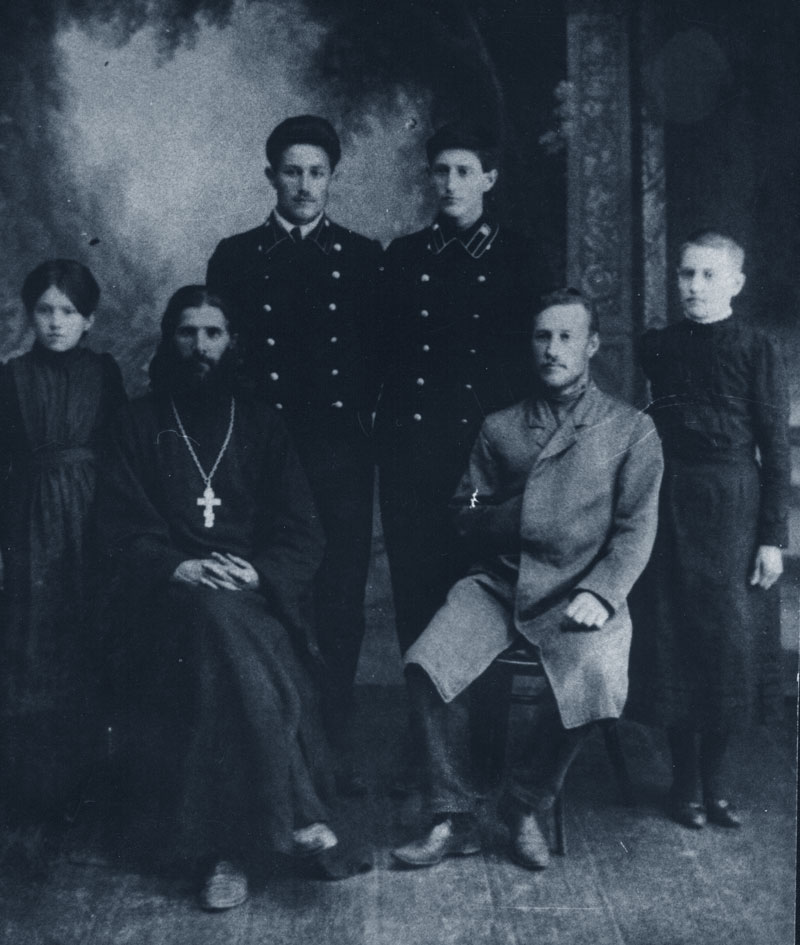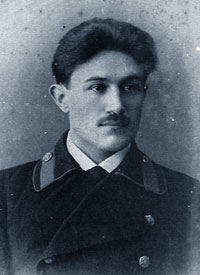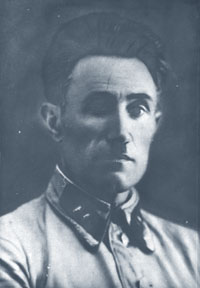









(A chronological description of their lives with lots of biographical details on Veniamin Nikolayevich Protopopov)
Proceeding from the origin of the family name, as well as convincing genealogical details, the Protopopovs came of the clerical class.
 Veniamin Nikolayevich was born in the village of Beloyarskiy, Minusinsk
district, Yeniseysk Government, on the 31st of March 1891. He was born into a
family of many children - the family of the clergyman Nikolay Protopopov. His mother, Anna Dmitriyevna,
maiden name Bystrova, was born in 1868; she was a housewife. There were 17
children in her family, however, most of them died during their childhood. Those,
who stayed alive, were the two brothers Feofil and Viktor, as well as the
sisters Antonina (born on the 26th of June 1898) and Yelena (born on the 3rd of
June 1900). In the following time the Protopopov family moved to the Kazachinsk
district, where the father continued to work as a clergy man in the villages of
Kemskoye and Mokrushinskoye. Nikolay’s brother Innokentiy worked in this
district as a clergyman, too.
Veniamin Nikolayevich was born in the village of Beloyarskiy, Minusinsk
district, Yeniseysk Government, on the 31st of March 1891. He was born into a
family of many children - the family of the clergyman Nikolay Protopopov. His mother, Anna Dmitriyevna,
maiden name Bystrova, was born in 1868; she was a housewife. There were 17
children in her family, however, most of them died during their childhood. Those,
who stayed alive, were the two brothers Feofil and Viktor, as well as the
sisters Antonina (born on the 26th of June 1898) and Yelena (born on the 3rd of
June 1900). In the following time the Protopopov family moved to the Kazachinsk
district, where the father continued to work as a clergy man in the villages of
Kemskoye and Mokrushinskoye. Nikolay’s brother Innokentiy worked in this
district as a clergyman, too.
Being the children of a servant of God, Veniamin and Feofil passed through the Krasnoyarsk Humane Seminary (today the building of the garrison hospital), while Antonina and Elena were educated at the eparchial school.
Afterwards Veniamin Nikolayevich was a student of the faculty of medicine at the Tomsk States University. Having finished his studies in 1916, the young physician Protopopov was mobilized into the army and sent to the front, where he worked for the regimental hospital till the end of World War I.
 For some time V.N. Protopopov was working as a medical officer in the town of
Yaroslavl. There he got married to the young teacher Olga Yevgenevna Morevaya in
1918 – the future mother of their first-born son Valentin, who was born in
Vladivostok on the 12th of December 1918, where Veniamin Nikolayevich had been
sent on official order together with his family. However, their common life did
not last long, since the young woman died of typhoid fever soonafter. In 1918
the life of Veniamin Nikolayevich’s father and his younger, sixteen-year-old
brother Viktor ended tragically by the hands of red bandits, who shot them dead
in front of their house. Brother Feofil died during the Civil War at the front
near Kazan in 1920.
For some time V.N. Protopopov was working as a medical officer in the town of
Yaroslavl. There he got married to the young teacher Olga Yevgenevna Morevaya in
1918 – the future mother of their first-born son Valentin, who was born in
Vladivostok on the 12th of December 1918, where Veniamin Nikolayevich had been
sent on official order together with his family. However, their common life did
not last long, since the young woman died of typhoid fever soonafter. In 1918
the life of Veniamin Nikolayevich’s father and his younger, sixteen-year-old
brother Viktor ended tragically by the hands of red bandits, who shot them dead
in front of their house. Brother Feofil died during the Civil War at the front
near Kazan in 1920.
As from 1920 V.N. Protopopov worked as a medical officer for the Krasnoyarsk garrison, at first as an assistant physician in the hospital, then as an assistant medical director of the army, head of the military ambulance station of the Yeniseysk Governmental Department of Public Health and later as the medical director of the flying squadron and artillery regiments.
On the 25th of April 1922 Veniamin Nikolayevich got married to Alevtina Mikhailovna Novoselova, born on the 9th of July 1896 in the town of Kungur, gouvernment of Perm. Alevtina Mikhailovna, who had already lost her parents in early youth, first grew up at her grandmother’s home and later at the house of her godmother Odintsova. She became a pharmacist and moved to Krasnoyarsk, where she worked many years for the pharmacy No. 3. The aunt’s husband – Mashanov, who had been an industrialist working in the gold business in the past, died in the early 1920s in Yekaterinburg; soonafter the aunt was bestially murdered in her own house by tenants, who had intended to rob her.
On the 27th of August 1923 the second son, Boris, was born to the Protopopovs. At this time they lived, together with Veniamin Nikolayevich’s mother Anna Dmitriyevna, in a private residence, which they had rented in a one-storey house made of stone in Lebedevaya street No. 1 (very near to Surikova street). The housing conditions were very cramped and they were not well furnished, either.
On the 22nd of February 1926 there was an addition to the family – son Yuriy was born. At this time the family moved into a nearby bought house in Lebedevaya street No. 34 (which later became No. 42). Veniamin Nikolayevich’s sister Antonina Nikolayevna moved into this house, as well, after having concluded her medical studies at the Tomsk University and having started to work as a physician in the city of Krasnoyarsk.
As from 1926 V.N. Protopopov worked as an assistand medical director for the Krasnoyarsk hospital and, being the head of the therapeutical department, up to the very end holding the titel of a medical officer of 2nd rank.
According to the remembrances of the people, who had known him very well, his personal qualities have to be stressed out: an immense emotional sensitiveness, noble-mindedness and an extraordinary charm. He was a convinced tetotaller (this outstanding trait of character was with the Proptopopovs’ family tradition). He was fond of folk and classical music, particularly operas. He himself had a fine-sounding voice; he first used to sing in the church choir together with his brothers and later at the ecclesiastic seminary. His brothers played the mandolin and the guitar quite well. Some time later, when Veniamin Nikolayevich was already working for the military hospital, he and his workmates, according to the tradition of that time, would passionately sing the “International” on ceremonial occasions dedicated to the Revolution.
On the 19th of March 1930 the youngest son Vladimir was born to the Protopopovs. As far as Veniamin Nikolayevich’s family was concerned, it has to be pointed out by all means that he always showed himself a thoughtful and attentive man – not only towards his own family members, but also towards the people living around. This also appears from the warm, cordial correspondance with many of his dearest and nearest, as well as from the self-sacrificing help he showed for his sisters during the years of their studies at the Tomsk University.
Already accustomed to diligence, hard work and farming from early age, he spent every free minute in addition to his job of being a physician for taking care of the big farm and particularly for his beloved, well-grromed horse, on which he often rode out to one of the numerous and very grateful patients down-town or in the neighbouring villages.
 During the 20 years of his occupation in the position of a medical officer
and the 16 years of service for the Krasnoyarsk garrison hospital, V.N.
Protopopov was rewarded the well-deserved love and respect of many of his
patients, colleagues and companions-in-arms, which became evident in many proofs
of gratitude and precious gifts he received on proletarian holidays. Among the
sick persons treated by him, there were well-known people like the trainer N.
Gladilshchikov and the polar explorers I.L. Papanin and O.Y. Schmidt, and others.
During the 20 years of his occupation in the position of a medical officer
and the 16 years of service for the Krasnoyarsk garrison hospital, V.N.
Protopopov was rewarded the well-deserved love and respect of many of his
patients, colleagues and companions-in-arms, which became evident in many proofs
of gratitude and precious gifts he received on proletarian holidays. Among the
sick persons treated by him, there were well-known people like the trainer N.
Gladilshchikov and the polar explorers I.L. Papanin and O.Y. Schmidt, and others.
V.N. Protopopov was an extraordinarily intelligent man, a shining example of the self-sacrificing attitude towards his beloved profession, a man, who gave all his strength, skill and knowledge for the health of the people.
However, as many other close relatives, he was unable to escape his fate. Having been caught up the whirlpool of completely unfounded reprisals, he was arrested on the 23rd of November 1937 late at night. The NKVD workers searched through the house of this honest and conscientious physician throughout the whole night, and the whole family, including the little children, were roused from sleep. Everything was turned upside down and, of course, they did not find a single circumstancial evidence for any guilt. After having found, however, some kind of a corpus delicti - a pack of magazins, hunting arms and a “Browning” pistol, by which Veniamin Nikolayevich had been honoured for his outstanding performance and results at the garrison hospital, day was already breaking (it was around 8 o’clock in the morning), a “Gazik” (automobile from the “Gorkiy” plant; translator’s note) approached, and all family members had to say good-bye to the beloved father and husband. None of the relatives ever saw him again alive. Our mother – Alevtina Mikhailovna spent lots of days at the commandant’s office waiting for letters or any other kind of information to come. But she always received the same reply: “Arrested and sentenced to a period of 10 years without having the right to send or receive letters and parcels”. It has to be mentioned that Veniamin Nikolayevich was in a poor state of health. Several years he had suffered from ulcerous diseases, which had become worse in the course of time. Apart from this, he had not taken regular leave in the year of his arrest, which is certified by a written authorization issued in the name of his wife, allowing her to receive money. Veniamin Nikolayevich sent the last news about himself in April 1938. It was his very last letter, in which he said good-bye to his family.
After the arrest of the head of the family V.N. Protopopov’s realtives lived in a state of anxiety and fear. This situation was also favoured by the public sentiment in the country, as well as the behaviour and attitude of their next neighbours. Some of them started, in fact, to consider members of the family “enemies of the people”.
When saying good-bye by letter, Veniamin Nikolayevich urgently requested his sister Antonina Nikolayevna to help with the bringing up of his children, so that they would be able “to stand on their own feet”. At this time the family got increasingly worried about a possible confiscation of their property and an arrest of the mother. In order to prevent off these consequences, the cow and the horse were sold without delay - at half of their real prices.
And the mother was urged to move, whereupon she left for the village of Shalo, Mana district, in hot haste, where she stayed until 1941 without changing her place of residence again. She lived there and worked for a chemist’s shop. Son Boris was sent away to Moscow in 1938 to stay with aunt Yelena Nikolayevna and continue his school education. The arrest of his father had almost broken his heart. However, as the saying goes, it never rains but it pours. Misfortune would have it that, on the eve of a holiday, the mother unintentionally overturned the samovar with boiling water when wiping the floor. She sustained serious scalds on most parts of her body and had to stay in hospital for the treatment of her injuries for about one year. Unfortunately, complications arose: incurable ulcers developed on both lower legs, and the mobility of the knee joints was considerably limited. She suffered great pain till her dicease in 1974.
In October 1941, i.e. almost immediately after having finished school in Moscow, Boris was called up into the army. As the relatives learned, he was sent to the town of Gorkiy on foot in these alarming war times. In January 1941 they heard from him from Yoshkar-Ola that he was studying at the school of car mechanic. Early in 1942 he was sent to the Leningrad front, which became known after a visit in his apartment in Moscow, where he had intended to organize a reunion with his relatives. However, the meeting did not come off, for the aunt and the brother had left for Krasnoyarsk in January 1942. About this fact they learned from the neighbours of the former apartment in Moscow. The family did not receive any further news about Boris. In 1986 an inquiry about his fate was sent to the International Committee of the Red Cross and the International Missing Persons Tracing Service. They replied that nothing was known about his whereabouts.
The following yet has to be mentioned about two close relatives, Ivan Innokentyevich and Pyotr Innokentyevich Protopopov – the cousins of Veniamin Nikolayevich, the children of Innokentiy Protopopov, blood-brother of Nikolay Protopopov. Ivan Innokentyevich – a qualified lawyer, finished the Tomsk State University. He was an utterly intelligent and modest person. He lived and worked in Krasnoyarsk on the right banks of the river Yenissey (in the 2nd didtrict). He did not have a family of his own. As far as his state of health is concerned, one can say that he was a very sick man, who obviously suffered from stomach ulcers. The arrest of his brother Veniamin grieved him a lot. Before the war he had often been a guest of the family. When the war broke out their contacts suddenly broke off. On unconfirmed statements he committed suicide – he was reported to have jumped into an ice hole in the river Yenissey in 1942.
Pyotr Innokentyevich Protopopov was much younger than Ivan Innokentyevich; he had not gone through any particular vocational training, was a very modest and good-natured man. He also lived in Lebedevaya street, not far from Veniamin Nikolayevich’s house. He was often invited to the family, always used to help taking care of the horses and from time to time even fulfilled the tasks of a coachman. During the war he was called up into the army. His last letter came from his unit bearing a stamp of the 4th of December 1942. Nothing is known about his fate.
Early in 1957 Antonina Nikolayevna wrote a formal request regarding her brother to the Main Military Office of Public Prosecutor. On the 30th of October 1957 she received a certificate about the posthumous rehabilitation of Veniamin Nikolayevich Protopopov.
In 1989 I received a reply concerning the inquiry about my father. The UVD (Administration of the Interior; translator’s note) informed: “Your father, Veniamin Nikolayevich Protopopov was sentenced (in absentia) on §§ 58-7, 58-8 and 58-11 by a Military Collegium of the Supreme Court of the USSR to maximum penalty on the 14th of July 1938. He was executed on the same day.
In order to continue the subject on the illegalities and reprisals of the 1930s, we must not withhold the fact that one of the collectives, where practically all the heads and the very best specialists became the victims of political reprisals in 1937 and 1938, was the Krasnoyarsk garrison hospital, where Veniamin Nikolayevich Protopopov, together with other colleagues, devoted many years of his life to useful therapeutic treatments. Among them were: Nikolay Ivanovich Agishev, the head of the department of skin and veneral diseases; Pyotr Aristarkhovich Antropov, medical officer (2nd rank); Zinoviy Moiseyevich Goykhlerner, head of the pharmacy; Ilya Alexandrovich Aysenberg, neuropathologist and medical officer (1st rank); Vasiliy Alexandrovich Pokatiolo, commissioner of the hospital – and many others.
Based on this biographical insight into the lives of the Protopopovs, which is by far not complete, we may come to the conclusion that our century contributed to the fate of this family numerous tragic elements, which claimed a lot of victims. Many members of the family, who then prematurely departed this life and disappeared in anonymous graves, were inexorably exposed to the blows, and until today it is not known, where they were buried. An undeserved hard lot hit the house and family of the self-sacrificing Veniamin Nikolayevich Protopopov, who had been working throughout his whole life for the well-being of the people and who had to bear many ingenious moral and physical humiliations till his diastrous end in the torture chambers of the Krasnoyarsk GULag.
The tragical aspects in the lives of several generations of this original Siberian Protopopov family reflect like a mirror the detestable appearance of our unhuman epoch.
We can only believe and ardently hope that the cruel times our long-suffering people had to live through will never come back. God be with us!
The text was composed by Vladimir Veniaminovich Protopopov from remembrances
and a few existing documents.
Krasnoyarsk, January 1994